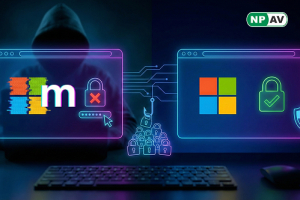Blogs
-
Read moreFIN7 uses SSH backdoor for remote access—learn about the tactics, persistence, and defenses to protect against this advanced threat.
-
Read moreMalicious Android apps on Google Play downloaded 42 million times—learn about the threats, evasion tactics, and defenses to secure your device.
-
Posted: November 05, 2025Views: 79Read moreBEC scam hits Noida mobile firm for ₹78 lakh—learn the tactics, investigation, and tips to avoid corporate email fraud.
-
Read moreHackers stole and sold 50,000 CCTV clips from Rajkot hospital—learn about the breach, methods, and tips to secure surveillance systems.
-
Read moreTrucking industry cyberattacks, RMM software exploits, cargo theft scams, freight manipulation, ScreenConnect vulnerabilities, credential harvesting, supply chain security, phishing prevention, logistics fraud, cyber-physical crime
-
Read moreGDI flaws in Windows allow remote code execution—learn about the CVEs, risks, and patches to secure your system from EMF-based attacks.
-
Read moreAardvark GPT-5 detects and patches vulnerabilities—learn how it works, its effectiveness, and how to access this AI-powered security tool.
-
Read moreWhatsApp introduces passkey backups with biometrics—learn how it simplifies security, resists threats, and protects your chats from unauthorized access.
-
Posted: October 31, 2025Views: 79Read moreLearn how SIM Swap Fraud hijacks your number for banking theft—spot signs, follow prevention tips, and secure your digital identity today.
-
Posted: October 29, 2025Views: 96Read moreHerodotus Android trojan mimics typing to bypass detection—learn about its tactics, infection methods, and tips to secure your device from banking fraud.
-
Read moreCVE-2025-54236 in Adobe Magento allows account hijacking—learn about active exploits, risks, and urgent patching needs to secure your e-commerce platform.
-
Read moreWindows 11 adds Quick Memory Scan after BSOD—learn how it detects issues, runs on reboot, and boosts system stability for smoother computing.
-
Read moreiOS 26 overwrites shutdown.log, erasing Pegasus traces—learn about the impact on forensics and tips to protect against spyware threats.
-
Read moreSurvey shows 81% haven't changed router passwords—learn about malware risks, attack methods, and simple steps to secure your home network.
-
Read moreCambodia-based syndicates orchestrate Indian cyber frauds—learn about "cyber slavery," massive losses, and the need for global cooperation to stop this transnational threat.
-
Read moreRajasthan cyber fraudsters use Chinese app to evade police—learn about the scams, tactics, and tips to protect against these evolving threats.
-
Read moreQilin ransomware uses Windows tools to steal data—learn about its tactics, targets, and defenses like monitoring and segmentation to protect against this growing threat.
-
Read moreAWS outage in US-EAST-1 caused by DNS failures—learn about the impact, recovery, and tips to mitigate cloud disruptions like this October 2025 incident.
-
Read moreCVE-2025-22167 in Jira allows file alteration via path traversal—learn affected versions, risks, and upgrade steps to secure your project management systems.
-
Read moreM&S terminates TCS contract post-₹3,200 crore breach—learn about social engineering tactics, outsourcing risks, and the need for stronger cybersecurity measures.

























